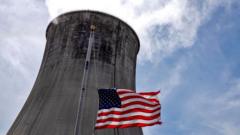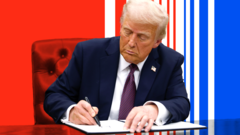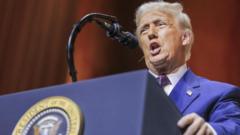This article explores the implications of China's latest tariffs on US goods, particularly in the energy sector, and the broader context of ongoing trade disputes.
**China Imposes Retaliatory Tariffs on US Coal and Gas Imports**

**China Imposes Retaliatory Tariffs on US Coal and Gas Imports**
China responds to US tariffs with taxes on coal and natural gas, stirring global trade tensions.
China has announced a new round of retaliatory tariffs targeting US imports, specifically coal and liquefied natural gas, effective from Monday. This move comes in response to President Donald Trump's implementation of a 10% tariff on all Chinese goods. The Chinese government has decided to impose a 15% tax on US coal and natural gas, while other commodities, including crude oil, agricultural machinery, and various motor vehicles, will face a 10% tariff.
The situation escalated as China lodged a complaint with the World Trade Organization (WTO), accusing the US of violating international trade rules. In defense of his administration's stance, Trump argued that the tariffs are a necessary measure to tackle the significant trade deficit and to address the issue of fentanyl trafficking—asserting that the chemicals for the drug originate from China. Conversely, Beijing maintains that the fentanyl crisis is predominantly an American problem.
In its retaliatory announcement, China stated that the tariffs would hinder rather than help resolve trade issues, describing the situation as detrimental to the cooperative economic relationship shared between the two nations. As part of the backlash against the US tariffs, China has also expanded its "unreliable entity" list targeting more American companies, including PHV Corp (the parent company of popular clothing brands) and the biotechnology firm Illumina, accusing them of discriminatory practices against Chinese businesses.
Additionally, China plans to restrict the export of 25 critical minerals, vital for many industries including aerospace and renewable energy. Essential materials such as tungsten and tellurium, along with molybdenum, are among those under export control scrutiny, raising concerns about supply chains dependent on these minerals.
Simultaneously, a Chinese regulatory body has initiated an investigation into Google for potential antitrust violations, despite the company's search services being blocked in China since 2010. However, Google still operates in specific areas through local partnerships, highlighting the complexities of international business relations amidst growing tensions.
The ongoing trade war continues to affect economic stability, with America's relationships with China, Canada, and Mexico accounting for over 40% of US imports last year. Following negotiations, Trump recently suspended the threatened 25% tariffs on Mexican and Canadian goods for 30 days, leading to hopes for improved border security and actions against fentanyl trafficking. Nevertheless, uncertainty looms as businesses face tough decisions on investments and operations in the affected markets while awaiting clarity on the trade discourse between the US and its neighbors.
Overall, the tit-for-tat tariff imposition exemplifies the fragility of global trade dynamics, as nations respond strategically to perceived economic threats and national interests.
The situation escalated as China lodged a complaint with the World Trade Organization (WTO), accusing the US of violating international trade rules. In defense of his administration's stance, Trump argued that the tariffs are a necessary measure to tackle the significant trade deficit and to address the issue of fentanyl trafficking—asserting that the chemicals for the drug originate from China. Conversely, Beijing maintains that the fentanyl crisis is predominantly an American problem.
In its retaliatory announcement, China stated that the tariffs would hinder rather than help resolve trade issues, describing the situation as detrimental to the cooperative economic relationship shared between the two nations. As part of the backlash against the US tariffs, China has also expanded its "unreliable entity" list targeting more American companies, including PHV Corp (the parent company of popular clothing brands) and the biotechnology firm Illumina, accusing them of discriminatory practices against Chinese businesses.
Additionally, China plans to restrict the export of 25 critical minerals, vital for many industries including aerospace and renewable energy. Essential materials such as tungsten and tellurium, along with molybdenum, are among those under export control scrutiny, raising concerns about supply chains dependent on these minerals.
Simultaneously, a Chinese regulatory body has initiated an investigation into Google for potential antitrust violations, despite the company's search services being blocked in China since 2010. However, Google still operates in specific areas through local partnerships, highlighting the complexities of international business relations amidst growing tensions.
The ongoing trade war continues to affect economic stability, with America's relationships with China, Canada, and Mexico accounting for over 40% of US imports last year. Following negotiations, Trump recently suspended the threatened 25% tariffs on Mexican and Canadian goods for 30 days, leading to hopes for improved border security and actions against fentanyl trafficking. Nevertheless, uncertainty looms as businesses face tough decisions on investments and operations in the affected markets while awaiting clarity on the trade discourse between the US and its neighbors.
Overall, the tit-for-tat tariff imposition exemplifies the fragility of global trade dynamics, as nations respond strategically to perceived economic threats and national interests.





















